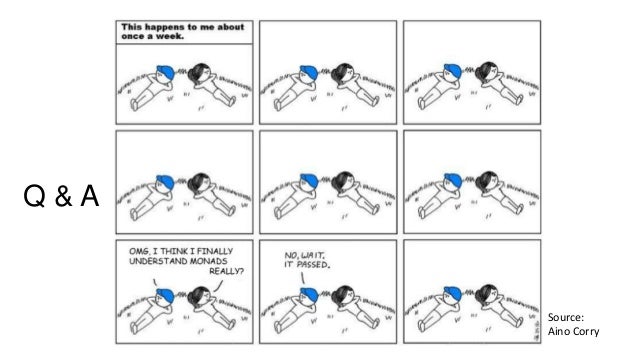Someone referenced "Crockford's law" recently with respect to monads. Google shows very little in the way of results. Anyone know what it is?
Assuming "Crockford's Law" is The Curse that he mentions early in the video, he's referring to this common occurrence (described much more eloquently here):
Here's are some of the reasons why I think The Curse exists:
I have fallen victim to The Curse. :(
It sounds like Crockford has as well, based on one of the questions at the end: "so monads are basically just the Builder pattern?" IMHO, it's a great video for learning kick-ass Javascript techniques, but not so great if you actually want to learn about monads.
If you are trying to learn about monads, just put in the time and effort and do lots of examples. Reimplement all the monad instances and combinators from scratch. Eventually you will be in a position to fall victim to The Curse as well!
 (alternate link) |
Crockford conundrum - the inability of Haskell beginners to help other Haskell beginners to understand monads, before or after they understand it themselves; the phenomenon typically seen in Haskell beginners who have been trying to figure out how to print "Hello, world!". Occasionally offered up as proof of the futility of presenting Haskell beginners with a model of I/O relying on an abstract data type (A.D.T.) whose interface is based on "one of the most abstract branches of mathematics". Sometimes given as one reason for teaching JavaScript in introductory courses instead of Haskell. Rumoured to be under consideration for inclusion to the Millennium problems by The Clay Institute of Mathematics.
Alternate names: Crockford complex, Crockford's law.
If you love us? You can donate to us via Paypal or buy me a coffee so we can maintain and grow! Thank you!
Donate Us With